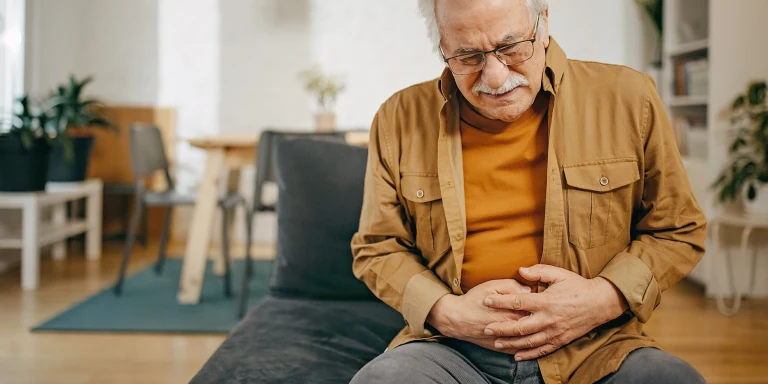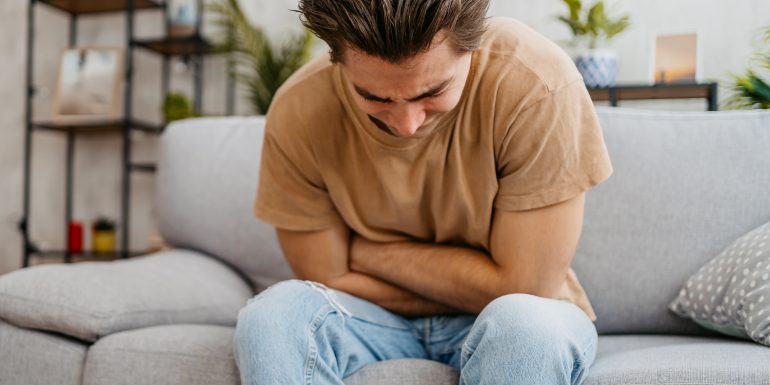
Diarrhoea: what can you do?
No stool, just mucus and liquid – what is that? What does explosive diarrhoea after eating mean? What helps with diarrhoea? Read on to find out everything you need to know about diarrhoea, its potential causes, and your options for treating it.
Diarrhoea: a definition
Medical professionals refer to diarrhoea if at least one of the following criteria is met:
- You need to defecate more than three times a day.
- The consistency of your stools has changed from firm or soft to liquid.
- You pass more than 200 grammes of faeces per day.
There are two kinds of diarrhoea:
- Acute diarrhoea lasting up to two weeks.
- Chronic diarrhoea lasting longer than two weeks.
Diarrhoea isn’t an illness in its own right, but a symptom. There are a lot of illnesses that can cause diarrhoea. The exact triggers can range from simple infections to complex conditions.
The causes of diarrhoea
There are a number of different causes of diarrhoea. The most common causes of acute diarrhoea include:
- Gastro-intestinal infections
- Poisoning
- Medication
- Psychological pressures such as stress
- Exposure to radiation as part of cancer treatment
- Food intolerances
- Significant physical exertion
The potential causes of chronic diarrhoea include:
- Hormonal disorders
- Irritable bowel syndrome
- Inflammation of the stomach lining
- Tumours
- Lactose intolerance
- Gluten intolerance (such as coeliac disease)
- Chronic inflammatory bowel conditions such as Crohn’s disease or ulcerative colitis
- Chronic pancreatitis
- Excessive consumption of laxatives
- Other medications (antibiotics, proton-pump inhibitors, rheumatism medication, antidepressants, cholesterol reducers, chemotherapy)
The potential causes of diarrhoea vary depending on the colour and shape of your stools.
The colour of diarrhoea
The colour of the stools tells us a lot. Sometimes, an unusual colour is due to what we eat. There are, however, other potential causes:
- Yellow diarrhoea: yellow diarrhoea is often greasy (fatty stool). This is frequently caused by health problems such as jaundice or food intolerances. Some infectious gastric diseases can also cause yellow, watery diarrhoea.
- Green diarrhoea: green diarrhoea indicates a potential salmonella infection. A gastro-intestinal infection can also cause green stools and diarrhoea. Certain medications also sometimes cause green diarrhoea in adults and children.
- Green or orange diarrhoea: some illnesses disrupt the absorption of bile salts. This leads to the increased excretion of water and electrolytes, and therefore green or orange diarrhoea.
The consistency of diarrhoea
Whether it’s watery or slimy – the consistency of diarrhoea also tells us something about its cause.
- Watery diarrhoea: gushing, watery effluence occurs if the faeces leaves the large intestine too quickly. If the diarrhoea is like water and light brown, you may be suffering from an overactive thyroid. Laxatives also cause watery diarrhoea with no nausea, vomiting or other symptoms.
- Slimy diarrhoea: all stools contain mucus to make them easier for the body to expel. If the diarrhoea is unusually slimy, however, this may indicate an inflammatory gastro-intestinal disease such as Crohn’s disease. Other conditions that can lead to the passing of mucus instead of faeces are infectious diseases, food intolerances and cancer.
The timing of diarrhoea
The cause of diarrhoea can often be determined based on when it occurs. If you regularly experience diarrhoea after eating, you may have an intolerance. Lactose intolerance or coeliac disease, for example, frequently cause diarrhoea after eating. Food poisoning also causes diarrhoea immediately after meals. Explosive defecation after eating may be due to irritable bowel syndrome. The pancreas is sometimes also the cause of diarrhoea after food. People with exocrine pancreatic insufficiency frequently experience stomach pains and diarrhoea after eating. These complaints mainly occur after eating fatty meals or foods that are hard to digest. Keep a food diary if you suspect that you might have one of these conditions. The information you have compiled on timings, food intake and symptoms will help your doctor make the right diagnosis.
Stress is another potential cause of diarrhoea. If the diarrhoea occurs after a taxing week at work, for example, this mental pressure is probably the trigger. This is because stress causes the body to release hormones, which increase the flow of fluids into the gut – resulting in diarrhoea.
Diarrhoea: when should you seek out a doctor?
Diarrhoea is usually harmless if it only occurs once or passes quickly. The question of when you should seek out a doctor depends on the accompanying symptoms. You should talk to a doctor in the following cases:
- If you experience profuse sweating, fever or dizziness in addition to diarrhoea.
- If the diarrhoea occurs particularly frequently after eating.
- If the diarrhoea is chronic or particularly severe.
- If the diarrhoea lasts for longer than three days.
- If you experience bloody diarrhoea or pus in your stools.
- If you are showing signs of dehydration, such as urinating less, or suffering from lethargy, listlessness, extreme thirst or a dry mouth.
Always consult a specialist if you are unsure. They will tell you what you should do if you are suffering from diarrhoea. They will also assess whether any serious diseases are the cause of the diarrhoea. Whether your diarrhoea is watery or yellow, a medical professional knows best what needs to be done in cases of doubt.
Diarrhoea is not one of the typical complaints experienced during pregnancy. While there is not usually any risk to you or your child, you should, however, consult a doctor:
- If the diarrhoea is accompanied by a fever or strong stomach pains.
- If the diarrhoea gets worse or lasts longer than three days.
- If you have blood in your stools.
Diarrhoea in children and babies
Diarrhoea in babies calls for particular caution because their bodies are not yet able to compensate for the associated loss of salt and fluid. The same applies to diarrhoea in infants. Both babies and children are more susceptible to dangerous pathogens that cause diarrhoea and other complaints. You should always consult a paediatrician as soon as possible, including if your baby or infant has diarrhoea that’s yellow and smells bad.
Important: specialists class a baby as having diarrhoea if they pass more than five thin stools per day, or more than three thin stools per day for infants.
What helps with diarrhoea?
There are a number of measures that help against diarrhoea, ranging from household remedies for diarrhoea and diarrhoea medications to foods that help with diarrhoea. What can you do about diarrhoea?
It’s not rare to experience diarrhoea while you’re on holiday. This often occurs if you struggle with the heat, but germ-laden food is another possible cause. Unfamiliar, exotic seasoning and spicy food can also sometimes cause diarrhoea. How can you prevent diarrhoea? Avoid spending too much time in the heat and strenuous activity. You should also avoid heavy and highly seasoned meals. Only eat food that has been boiled, fried or peeled, and wash your hands regularly. And what can you do if you experience diarrhoea while you’re on holiday? Make sure to drink enough bottled or boiled water; take medication if necessary. Talk to a medical professional or tour operator if required.
Household remedies for diarrhoea
Household remedies are often effective against diarrhoea. Here are some household remedies for diarrhoea:
- Sugar-salt solution: make this household diarrhoea remedy by bringing half a litre of water to the boil. Add five teaspoons of sugar and half a teaspoon of salt. Drink the solution.
- Medicinal clay: dissolve a tablespoon of medicinal clay in water and drink the mixture. This may be beneficial for your gut flora, but no scientific studies have been conducted in this regard.
- Hot water bottle: a hot water bottle can sometimes help when you have problems with your digestion. Use one if your diarrhoea is also accompanied by flatulence or stomach pains.
These are the household remedies for diarrhoea in adults. You should consult a doctor if your child is affected; they will tell you what will help with your child’s diarrhoea.
Medication for diarrhoea
Apart from household remedies, what else can you do to combat diarrhoea? It sometimes makes sense to take medication to treat diarrhoea. The following medications help with diarrhoea:
- Diarrhoea medications containing loperamide: this active ingredient is available in the form of diarrhoea capsules or tablets.
- Charcoal tablets for diarrhoea: these diarrhoea tablets have an absorbing effect which helps them to stop diarrhoea.
- Probiotics and products containing tannins for diarrhoea: probiotics such as Perenterol and plant-based products containing tannins are good for recovery.
Never take diarrhoea medication for longer than recommended. You should seek out a doctor if the diarrhoea doesn’t stop, or even gets worse.
What should you eat and drink if you have diarrhoea?
It is particularly important to eat and drink well when you’re suffering from diarrhoea. This will provide your body with the energy and nutrients that it is losing more of as a result of the diarrhoea. What should you eat if you’re suffering from diarrhoea? Plain, easily digestible foods are best for both children and adults. Light foods that are good if you’re suffering from diarrhoea include:
- Rusks
- Grated apple
- Puréed banana
- Rice
- Carrot soup
- Potatoes
- Oats
- Yoghurt
You should avoid foods with a laxative effect. What foods have a laxative effect? Laxative foods include sauerkraut, strong coffee and fresh stone fruits. You should also avoid foods that are hard to digest, such as cabbage and pulses, along with fatty or highly seasoned meals if you are suffering from diarrhoea. If you are in any doubt, your doctor will tell you what you can eat.
What else can you do to ease diarrhoea? You should make sure that you get enough to drink. But what should you drink if you’re suffering from diarrhoea?
- Tea for diarrhoea: what kinds of tea help with diarrhoea? You should opt for black tea if you’re suffering from diarrhoea. Black tea contains tannins that reduce inflammation and irritation. Other teas that are good against diarrhoea are peppermint, ginger, fennel and chamomile.
- Water: opt for still water.

The specialist provided the editorial team with advice and input for this article. Sonja Signer (qualified nurse) works for the Helsana health consultation service. She helps customers on issues to do with prevention and health promotion.


Newsletter
Find out more about current health issues every month and get all the information you need about our attractive offers from all Helsana Group companies * delivered by e-mail to read whenever it suits you. Our newsletter is free of charge and you can sign up here:
We did not receive your information. Please try again later.
* The Helsana Group comprises Helsana Insurance Company Ltd, Helsana Supplementary Insurances Ltd and Helsana Accidents Ltd.